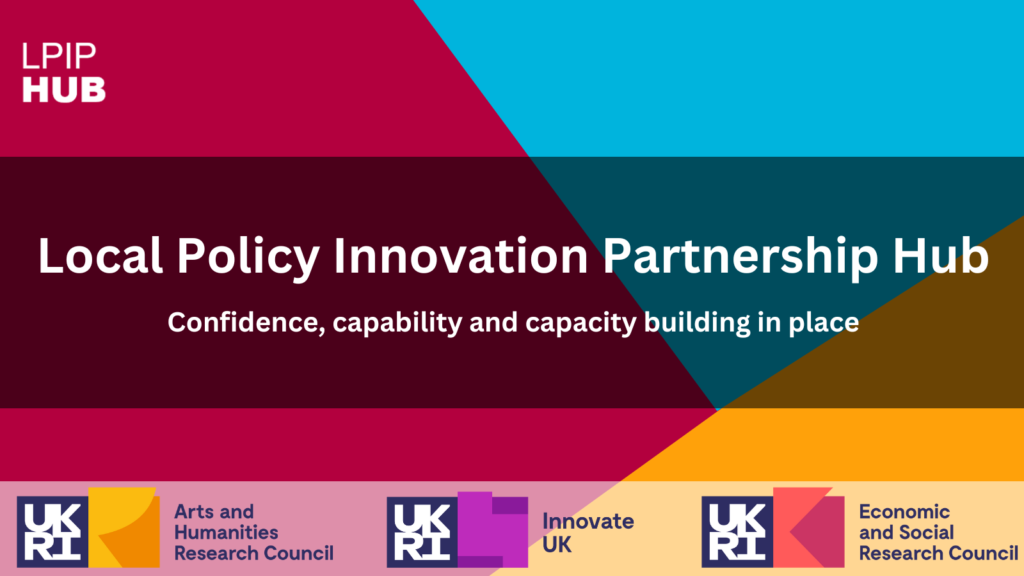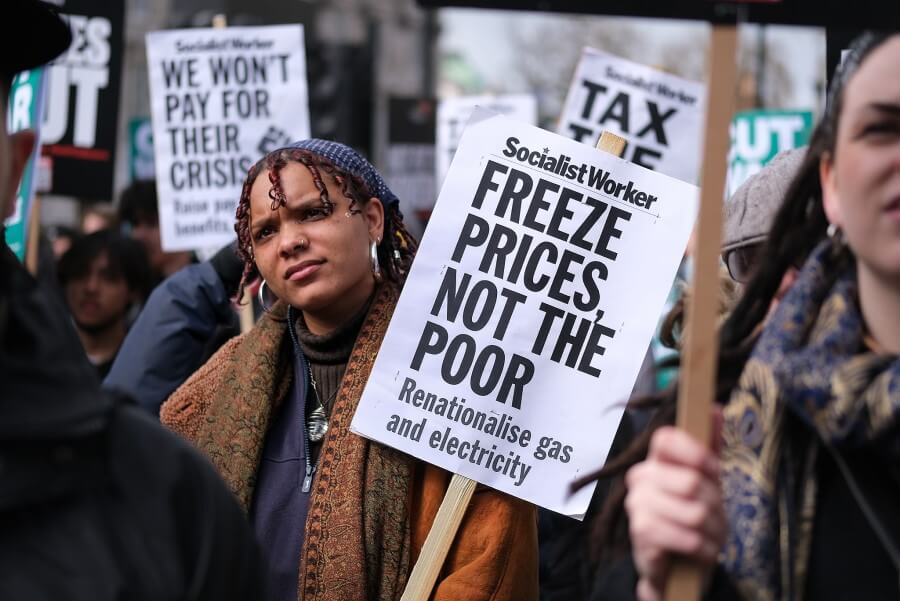The 1st of June saw the launch of the Local Policy Innovation Partnership (LPIP) Hub, a new project aiming to build confidence, capability and capacity for places. Rebecca Riley, who leads the LPIP Hub, discusses its mission. Find out more about the LPIP Hub.
The LPIP programme will fund a network of Local Policy Innovation Partnerships to address social, community, economic and environmental priorities. Concurrently, the Hub will convene across the research and policy ecosystem to help connect LPIPs to the research, expertise and evidence needed to inform effective responses to local priorities. The Hub (LPIP Hub) led by the City-REDI based at the University of Birmingham will work with the Local Policy Innovation Partnerships (LPIPs) to:
- Convene stakeholders across the research and policy ecosystem
- Draw together an understanding of local challenges
- Act as a front door to national policy stakeholders
- Support engagement across the network
- Assess the transferability of their findings across the network and beyond, including support through a commissioning fund
Our partnership approach to delivering the Local Policy Innovation Partnership Strategic Coordination Hub (LPIP Hub) is informed by our collective academic and practitioner curiosity about ‘what works’ in place-based policy partnerships. Local Policy Innovation Partnerships (LPIPs) are being established as place-based organisations are gaining new powers through devolution and which has shown how local partnership working is vital in responding and building resilience to shocks and inequalities caused by Brexit, the Covid-19 pandemic and the rising cost of living. They need to base decisions on good evidence to pursue inclusive, sustainable, economic growth. Local and national policy capability is struggling to keep up with change even though research and innovation can play a vital role in tackling the challenges places face, with a lack of awareness of what is available; limited resources; pressures for immediate responses, inadequate capability to ‘translate’ and apply research; the complexity of research findings; and resistance to change all creating barriers.
These issues are compounded at a local level where resources and capability are particularly constrained, with wide variation between different place contexts (rural versus urban, unitary versus two-tier, metro mayors, special measures versus stable performers, etc). The Hub will work with first and second-phase LPIPs to help overcome these barriers and enable change through a collaborative ‘Policy Hive’ structure, sharing knowledge and expertise in ‘what works for place’, responding to the place capacity gap identified by researchers from City-REDI and elsewhere (Newman et al, 2021; Romaniuk et al, 2021; Taylor et al, 2021) and bringing together partners and stakeholders across the research and policy ecosystem.
We will draw together an understanding of local challenges; act as a front door to national and local policy stakeholders; support engagement; build capability; assess the transferability of findings (across UK geographical scales and internationally); and use a separate fund to support promising strands of innovation and collaboration across the policy ecosystem. We will translate local action that is specific into generalisable and national practice. Activities may be best conducted at local, sub-regional, regional, or national levels depending on their character, and powers may not – even once devolved – get to the right level. The Hub will have the oversight to engage and share practice across levels, as well as the flexibility to respond to stakeholder needs.
Our partner insight: creating thriving places and supporting inclusive growth
There have been many policies since the 1920s to stimulate regional economic development and tackle issues of inequality, left behind places and the need to redistribute wealth and wellbeing (UK 2070 Commission, 2019). These include the Industrial Transference Scheme (1920s), the Urban Programme (1960s), Government Offices and Regional Development Agencies (1990s) and more recent competitive funding initiatives such as the Transforming Cities Fund and Community Renewal Fund (DLUHC, 2022; McCrone, 1969; Martin et al, 2021). Several programmes have addressed issues at a local level, with notable effects such as revitalizing cities, business creation, and skills development and inner-city improvement supported by international migration (Green et al, 2021; PWC, 2009; Sterrett et al, 2005).
However, these interventions have not succeeded in reducing entrenched disparities. ‘Levelling Up’ is the most recent and arguably most comprehensive policy response to the task of addressing stubborn spatial inequalities. There is evidence that geographical inequalities have “intensified in recent decades”, with regional policies being insufficiently “place-based” to revive economically lagging areas (Beer et al, 2020; Martin et al, 2021). Austerity measures have impacted on institutional ability to respond and there has been uneven innovation in services, with competitive approaches from government departments tending to increase disparities as those better able to respond have won the most funding (Eckersley and Tobin, 2019, Pike et al, 2018, Taylor, 2019). Places have also faced further shocks of Brexit (Thissen et al, 2020), the Covid-19 pandemic (Davenport and Zaranko, 2020) and the cost-of-living crisis (Atherton and Le Chevallier, 2022).
In the context of crisis, many places have learned valuable lessons, including better use of evidence and data to create policy responses, the power of partnerships (Hoole et al 2021), collaboration and the development of interventions to deal with Covid-19 impacts. There are valuable lessons in collaboration to solve bigger problems as crisis solutions have reshaped programmes and policies. There is a plethora of thematic and methodological research focusing on relevant topics, but nothing holistically addresses the issue of ‘What Works for Places’ or what does not work. Therefore, the Hub is a key step change in tackling these issues and will gather lessons from relevant academic and policy research, champion place-focused research across all UKRI research assets (such as the broader What Works Network, and Productivity Institute) and support research centres and teams to interact with place partners while working with LPIPs to apply findings and share knowledge within and across places.
LPIP Hub – developing effective local and regional research-policy partnerships
The main barriers to a successful place-focused ecosystem which the work of the LPIP Hub partnership will be designed to address include:
- Lack of learning from other places and past policy interventions (Romaniuk et al, 2020);
- Limited ability to scale from previous good practice and influence/improve the wider system (Newman et al, 2021);
- Insufficient learning/transfer of skills/knowledge from successful/unsuccessful place partnerships.
For universities, we will look to support the shortfall in skills and capacity across academia to deliver a place-based service and help design solutions by helping to resolve the:
- The disconnect of local university offer/scale of focus and place need (Metro Dynamics, 2022);
- Lack of brokerage/translation capacity within universities between place and policy (Taylor et al, 2021);
- Disparate or lack of capacity and research capability at the local level to invest time in connecting and utilising academic assets (NCCPE, 2019);
- and “overlapping university fields of activity” (Civic University Network, 2022). This has created a deficit of skills, opportunities or performance demands for academics to interact at a place level.
There is a shortfall in knowledge in universities about the policy process (ROAMEF – rationale, objectives, appraisal, monitoring, evaluation, feedback and government guidance in Aqua (HM Treasury, 2015) /Green (HM Treasury, 2022)/ Magenta (HM Treasury, 2020) which we will hope to improve. The silos within and between institutional structures and increasing short-term competitive processes and structures limit sharing, learning, and partnership working (Newman et al, 2021; Metro Dynamics, 2022) and reduce time to think and reflect on priorities and solutions. The recent review of funding for levelling up, and the challenges it seeks to address, have been widely welcomed across the political spectrum. However, the method of delivering funding, the allocation process, and the extent to which different funds have been compatible with the needs of communities in the short and long term is creating several obstacles to the policy’s success. The LPIP Hub will be seeking to address this issue by building greater connections between local and national policymakers.
There has also been a reduction in local authority research capacity and capability through austerity, an erosion of community capacity in left-behind places and an increase in Whitehall ‘churn’ – all of which have reduced the capacity to network and innovate. At the same time, the Levelling Up White Paper and the new ‘place’ chapter in the Green Book requires government to think about place when designing policy. Past government policies have tended to be place blind. Competitive funding structures limit the development of an ecosystem of learning and sharing best practice have led to an over-emphasis on short-term fixes as opposed to finding medium-term or longer-term solutions. This is a structural issue which we will seek to address in the delivery of the Hub.
This blog was written by Rebecca Riley, Associate Professor for Enterprise, Engagement and Impact, City-REDI / WMREDI, University of Birmingham.
Rebecca is the Director of the Local Policy Innovation Partnership (LPIP) Hub.
Disclaimer:
The views expressed in this analysis post are those of the authors and not necessarily those of City-REDI or the University of Birmingham.



